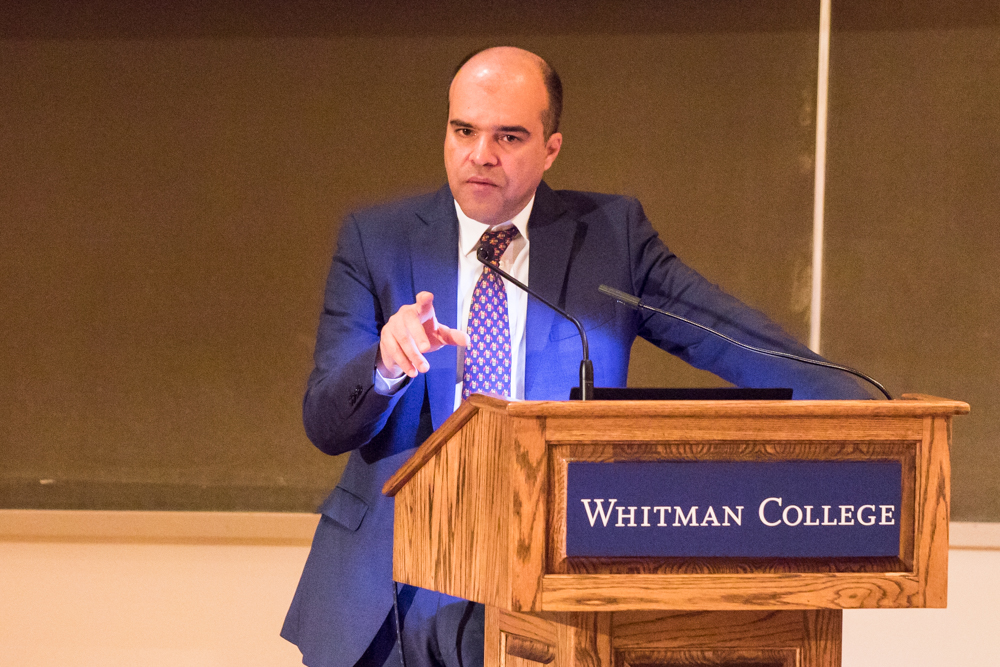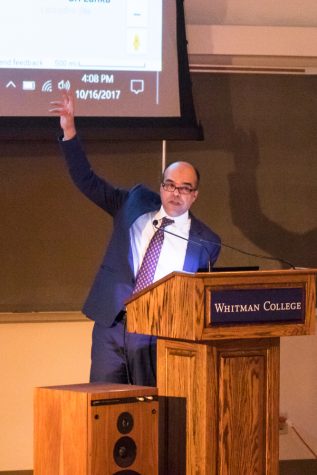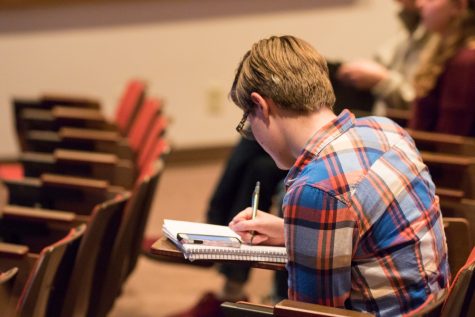Rabbani on Trump and the Fourth Estate
October 18, 2017
Analyst and researcher Mouin Rabbani was brought to campus earlier this week for a talk entitled “Crisis In the Gulf and Middle East Transformations.” His talk examines the June 2017 calamity between Qatar and Arab states. He has worked for International Crisis Group, The Institute for Palestinian Studies, and served for the United Nations. He is also a Co-Editor for Jadaliyya, an online magazine which examines news from the Middle East in English and Arabic for an international audience. Wire Reporter Chris Hankin sat down with Rabbani to chat about Jadaliyya, Trump and the Fourth Estate.

The Wire: Can you give our readers a sense of what “Jadaliyya” is, what defines this project and then, more broadly, what is your editorial philosophy?
Rabbani: We aim to provide new and alternative voices in the region, particularly given the widespread feeling among the founding editors that in the aftermath of 9/11 and the invasion of Iraq, a very one dimensional and often false impression of the Middle East was propagated through the media. [The region] seems to be little more than a collection of terrorists, camels and heavily-veiled women, whereas in fact it is a very vibrant and diverse and heterogeneous region of the world. It was purely a matter of timing that within six months of launch the so-called Arab Spring erupted, and this created a lot more interest … [The founding members of “Jadaliyya”] were seeing these systematic falsehoods spewed about Iraq–its alleged nuclear arsenal and all the rest of it–in the run up to the 2003 invasion, and then seeing how the public swallowed it hook, line and sinker. Those kinds of issues also played into “Jadaliyya’s” creation. Our hope is that by having a more informed readership, you could perhaps direct policy and over the longer run find more responsible ways of dealing with [cases like Iraq] … My own view is that the secret to our success is that it’s a volunteer-run operation. The Editorial Board work out of a sense of commitment rather than a sense of obligation.
The Wire: Can you talk about the role you see a free press playing in a correctly functioning Democracy?
Rabbani: I would say first that I’m not sure to what extent there is a free press. There are different levels of freedom, but I don’t know that any are entirely free. But I think it’s interesting [in the United States], because

I don’t live in this country, to be visiting at this point because I feel that one thing that Trump and his administration should be given credit for is that they seem to have really reinvigorated the American media. The kinds of things you see, to use a cliché, “speaking truth to power,” is something that I think has become much more prevalent than it was in previous years.
The Wire: I’m surprised to hear you say that, I have always felt that the Trump administration plays mainstream media like a fiddle, and that they don’t really do much in terms of, as you say, “speaking truth to power.”
Rabbani: Of course, and it’s certainly true that it’s virtually impossible to explain the rise of Trump without referring to all the free exposure he got [from mainstream media] that other candidates had to pay for. The head of CNN [Jeff Zucker] described Trump as “politically disastrous, but great for ratings,” or something to that effect. That’s certainly true. And I’m not trying to minimize that, but what I will say is that once he came into office, and even though these issues you mentioned of course still play a role, there has been more critical media coverage of the U.S. leadership than I’ve seen in many years.
The Wire: I have always counted Glenn Greenwald as a personal hero, and I think that his critiques of mainstream media are always so insightful. He wrote an article about media response to Trump inviting Egyptian President Abdel Fattah el-Sisi to Washington, and the media backlash that ensued. His point was that the United States has been giving the same amount of military aid to Egypt every year since 1979; many of Trump’s policies are not altogether new, but simply take the varnish off of old policies. And Greenwald ultimately critiques the mainstream media for totally missing that element.
Rabbani: That’s true, and I do feel that at least some of the [media] criticism [of Trump] is elitist. And it’s definitely true that there are policies that Trump has pursued for which he’s being criticized, which are virtually identical to policies that his predecessors pursued for which they were either ignored or praised. But you know, these are policies that should be criticized. So it’s nice to see that they’re finally getting their due.
The Wire: Fair enough. But perhaps moving away from Trump, let’s return to this broader question about the correct role of the Fourth Estate.
Rabbani: In my experience the main role of the Fourth Estate has been to prop up the first and second estates, basically serv[ing] as a mouthpiece for power. [Identifying] the proper role of the press, and whether or not this is no more than an ideal is difficult for me to say. Again I tend to use that cliché, “to speak truth to power,” and to expose abuses of power and to hold leaders to account. Whether in the government or in the corporate world. But to what extent is that a realistic ambition in the twenty-first century? I really don’t know. On the one hand, you have this extraordinary diffusion of media because of social media and people consuming news in their little respective silos. But on the other hand, when you look at the media organizations that you would want to play this role, they’re dealing with massive shortages of resources and qualified staff. If you look at how many foreign desks have been cut in the last few decades it’s a scandal.

The Wire: A lot of professors at Whitman assign Benedict Anderson, and we often discuss this idea of “imagined communities” in class. I’m curious about where you see “Jadaliyya” playing into this.
Rabbani: I don’t think you could have these national myths without the media. If you’re asking specifically about [“Jadaliyya’s” Editorial Board] we are, on the whole I think, collectively hostile to the idea of nations as conventionally understood and certainly to all of the mythologies that accompany nations. We of course defend inalienable rights, whether individual or collective, including the right to self-determination. But this idea of the nation as this mythological entity that stands above and beyond the individual, typically at the expense of individuals, is not something that I think many if any of us would subscribe to.





